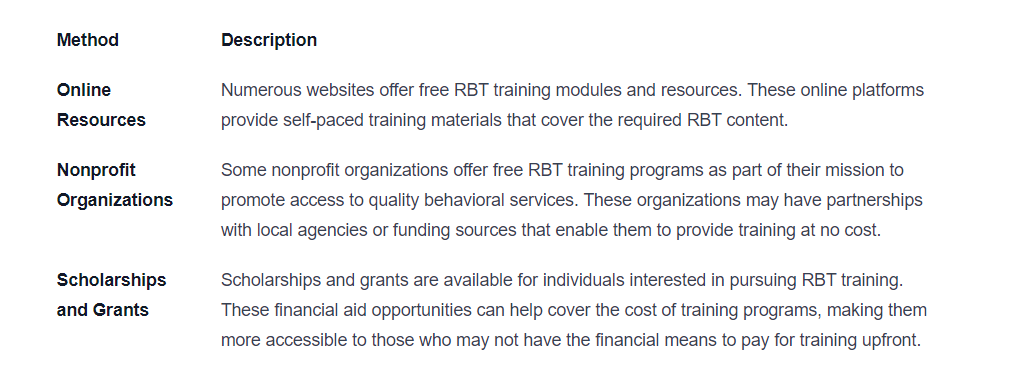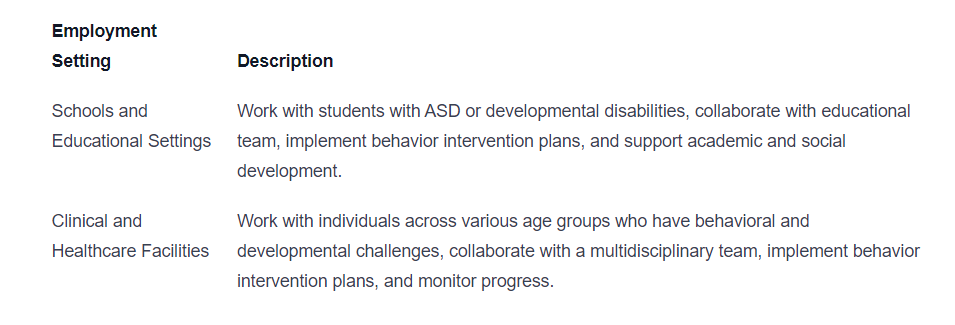Free RBT Training Jobs, Employment
Discover free RBT training jobs and unlock your career path in this booming field. Employment opportunities await!
.jpeg)
The Growing Field of RBT
In recent years, the field of Registered Behavior Technician (RBT) has experienced significant growth and recognition. Let's explore what RBT is and the increasing demand for RBT professionals.

What is RBT?
Registered Behavior Technician (RBT) is a credential offered by the Behavior Analyst Certification Board (BACB). An RBT is an entry-level position in the field of Applied Behavior Analysis (ABA) therapy. RBTs work under the supervision of Board Certified Behavior Analysts (BCBAs) to implement behavior intervention plans and provide support to individuals with behavioral challenges.
RBTs play a crucial role in helping individuals develop new skills, reduce problematic behaviors, and improve their overall quality of life. They work with diverse populations, including children with autism spectrum disorder, individuals with developmental disabilities, and those with behavioral disorders.
To become an RBT, individuals must complete specific training requirements and pass the RBT certification exam. RBTs are required to adhere to the ethical guidelines set by the BACB and maintain ongoing supervision and professional development.
The Demand for RBT Professionals
The demand for RBT professionals has been steadily increasing as the recognition of ABA therapy grows. ABA therapy has been proven to be effective in improving behavior and enhancing the lives of individuals with various behavioral challenges.
Schools, clinics, and healthcare facilities are among the primary employers seeking RBT professionals. The need for RBTs is particularly high in educational settings, where they work closely with students, teachers, and other professionals to implement behavior intervention plans and support the overall learning environment.
The demand for RBT professionals is driven by the growing understanding of the benefits of ABA therapy and the increasing prevalence of developmental disorders, such as autism spectrum disorder. The need for trained individuals who can provide evidence-based interventions and support is essential to meet the diverse needs of individuals and their families.
As the field of ABA continues to gain recognition and more insurance companies cover ABA services, the demand for RBT professionals is expected to continue to grow. This presents exciting opportunities for individuals interested in pursuing a career as an RBT.
By understanding the field of RBT and the increasing demand for RBT professionals, individuals can make informed decisions about pursuing RBT training and exploring employment opportunities in this rewarding field.
The Importance of Training
To excel in the field of Registered Behavior Technician (RBT), comprehensive training is essential. RBT training provides individuals with the knowledge, skills, and competencies needed to effectively support individuals with behavioral and developmental challenges. In this section, we will explore the importance of RBT training and how to find free training opportunities.
Why RBT Training is Essential
RBT training plays a vital role in ensuring that individuals are equipped with the necessary skills to provide high-quality behavioral services. Here are a few reasons why RBT training is essential:
- Ethical Standards: RBT training emphasizes the importance of adhering to ethical guidelines and professional standards. This ensures that RBTs maintain the highest level of integrity and provide ethical and effective behavior analytic services.
- Client Safety and Well-being: RBT training focuses on understanding and implementing behavior intervention plans to support individuals in achieving their goals. By receiving appropriate training, RBTs can ensure the safety and well-being of their clients throughout the intervention process.
- Effective Behavioral Interventions: RBT training provides individuals with a solid foundation in behavior analysis principles and techniques. This enables RBTs to effectively implement behavior reduction and skill acquisition programs, helping individuals make meaningful progress.
- Collaboration: RBT training emphasizes the importance of effective communication and collaboration with other professionals, such as Board Certified Behavior Analysts (BCBAs) and other members of the interdisciplinary team. This collaborative approach ensures a comprehensive and holistic treatment plan for clients.
Finding Free RBT Training Opportunities
Training can be a significant investment, but there are free RBT training opportunities available. Here are a few ways to find free RBT training:

By taking advantage of these free RBT training opportunities, individuals can acquire the necessary knowledge and skills without the financial burden. It's important to research and evaluate the credibility and quality of the training programs to ensure they align with the requirements set forth by the Behavior Analyst Certification Board (BACB).
In the next section, we will explore where to find free RBT training jobs, which can provide individuals with hands-on experience and further enhance their skills in the field of behavior analysis.
Where to Find Free RBT Training Jobs
If you're interested in pursuing a career as a Registered Behavior Technician (RBT), it's important to find opportunities for free RBT training jobs. These opportunities not only provide valuable hands-on experience but also help you acquire the necessary skills and knowledge to excel in your role. Here are two common avenues to explore when searching for free RBT training jobs.
Job Boards and Websites
Job boards and websites dedicated to behavioral health and therapy are excellent resources for finding free RBT training jobs. These platforms connect job seekers with employers who offer training programs as part of their hiring process. Here, you can find a variety of job listings that specifically mention free RBT training opportunities.
When exploring job boards and websites, look for listings that mention the availability of free RBT training or provide details about the training program. It's important to carefully review the job descriptions to ensure that the training is indeed offered at no cost. Some websites may require registration or subscription fees, so be cautious and verify the terms before committing.
Nonprofit Organizations and Agencies
Nonprofit organizations and agencies that focus on providing behavioral health services often offer free RBT training as part of their mission to support the community. These organizations may have partnerships with educational institutions, government agencies, or funding sources that allow them to offer training programs free of charge.
To find free RBT training opportunities through nonprofit organizations and agencies, search for local or national organizations that specialize in behavioral health services. These entities may have dedicated training programs or collaborations with other organizations to offer free training to aspiring RBTs.
It's important to note that while the training may be free, there may be eligibility criteria or a competitive application process to secure a spot in these programs. Additionally, some programs may require a commitment to work with the organization for a certain period after completing the training.
By exploring job boards, websites, nonprofit organizations, and agencies, you can find valuable opportunities for free RBT training jobs. These training programs not only equip you with the necessary skills but also provide a stepping stone towards a rewarding career as an RBT. Be sure to research and carefully review the details of each opportunity to ensure it aligns with your goals and aspirations.
Employment Opportunities for RBTs
As the field of Registered Behavior Technicians (RBTs) continues to grow, so do the employment opportunities for individuals who have completed RBT training. RBTs play a vital role in implementing behavior analysis interventions and working directly with clients. Here are two common employment settings where RBTs can find rewarding careers:
Working in Schools and Educational Settings
Many RBTs find fulfilling employment in schools and educational settings. In these environments, RBTs work closely with students who have autism spectrum disorder (ASD) or other developmental disabilities. They collaborate with teachers, special education professionals, and other members of the educational team to implement behavior intervention plans and support students in achieving their educational goals.
RBTs in schools and educational settings may work with students individually or in small groups, providing direct support and implementing behavior strategies. They help students develop social skills, manage challenging behaviors, and improve their overall academic performance. RBTs may also assist in collecting data and monitoring progress to ensure that interventions are effective.
Jobs in Clinical and Healthcare Facilities
RBTs also find employment opportunities in clinical and healthcare facilities. These settings include hospitals, clinics, rehabilitation centers, and outpatient treatment centers. RBTs in healthcare settings work with individuals across various age groups who have a wide range of behavioral and developmental challenges.
In clinical and healthcare facilities, RBTs collaborate with a multidisciplinary team of professionals, including behavior analysts, psychologists, and therapists. They implement behavior intervention plans, provide direct support to individuals, and collect data to monitor progress. RBTs in these settings may work with individuals with autism, intellectual disabilities, or other behavioral or mental health conditions.
To provide a clearer picture of the employment opportunities for RBTs, here is a table summarizing the common settings where RBTs can find employment:

As RBTs gain experience and further their education, they may have the opportunity to advance their careers and take on more specialized roles within these employment settings. It is important for RBTs to continue their professional development through ongoing training and staying up-to-date with the latest research and best practices in the field. By doing so, RBTs can enhance their skills and open doors to even more rewarding employment opportunities.
Tips for Success in RBT Training and Employment
When embarking on a career in RBT (Registered Behavior Technician), there are several key tips to keep in mind to ensure success in both training and employment. These tips include building a strong resume, preparing for RBT interviews, and prioritizing continuing education and professional development.
Building a Strong Resume
A well-crafted resume is essential for showcasing your qualifications and experiences in the field of RBT. When creating your resume, consider including the following information:
- Personal information: Include your contact details, such as your name, address, phone number, and email address.
- Objective statement: Write a concise objective statement that highlights your career goals and aspirations in the field of RBT.
- Education and certifications: List your relevant educational background, including any degrees or certifications you have obtained. Include details about your RBT training and certification.
- Experience: Highlight any previous experience working with individuals with developmental disabilities or in a behavior therapy setting. Emphasize your hands-on experience implementing behavior intervention plans.
- Skills: Showcase your skills that are relevant to the RBT role, such as strong communication, problem-solving, and data collection skills.
- References: Consider including references from professionals who can speak to your skills and work ethic in the field of RBT.
Remember to tailor your resume to the specific job requirements and include keywords related to RBT to increase your chances of being noticed by potential employers.
Interview Tips for RBT Positions
Preparing for an RBT interview is crucial to make a positive impression on potential employers. Here are some interview tips to help you succeed:
- Research the organization: Familiarize yourself with the organization's mission, values, and the population they serve. This will demonstrate your interest and commitment to the field.
- Review RBT concepts: Brush up on your knowledge of RBT principles, behavior analytic techniques, and ethical considerations. Be prepared to discuss how you would apply these concepts in real-world scenarios.
- Showcase your experience: During the interview, provide specific examples of how you have successfully implemented behavior intervention plans and worked collaboratively with other professionals.
- Demonstrate your interpersonal skills: RBTs often work closely with individuals with developmental disabilities and their families. Highlight your ability to communicate effectively, show empathy, and build rapport with clients and their support systems.
- Ask thoughtful questions: Prepare a list of questions to ask the interviewer that demonstrate your interest in the organization and your commitment to professional growth in the field of RBT.
Continuing Education and Professional Development
To thrive in the field of RBT, it's essential to prioritize continuing education and professional development. Staying up to date with the latest research, techniques, and advancements in the field will enhance your skills and open up new opportunities for growth. Consider the following avenues for continuing education:
Continuing Education Opportunities
Workshops and conferences
Online courses and webinars
Professional publications and journals
Supervision and mentorship programs
By actively seeking out these opportunities, you can deepen your knowledge, enhance your skill set, and position yourself as a dedicated and knowledgeable RBT professional.
In summary, building a strong resume, preparing for RBT interviews, and committing to continuous learning are key tips for success in RBT training and employment. By following these guidelines, you can increase your chances of securing a rewarding job in the field of RBT and making a positive impact on the lives of individuals with developmental disabilities.
Sources
https://autismpartnershipfoundation.org/free-rbt-training/
https://www.crossrivertherapy.com/rbt/free-training
Similar articles
We’re here to help you

Our team is here to assist you in this process. Contact us for any assistance.
it’s easy to apply
We Accept Most Insurances
Our in-network insurance partnerships make ABA therapy more accessible to families throughout our service areas.







Our Insurance Process
We'll request your insurance details to help us verify your plan's coverage for ABA therapy. Once we've received this information, we'll walk you through your benefits, including copayments, deductibles and out-of-pocket maximums, so you know what to expect in advance.
Our team will then handle the preauthorization and all the necessary paperwork.
.svg)





















.jpeg)


































.jpeg)




.jpeg)







.jpeg)











.jpeg)
















